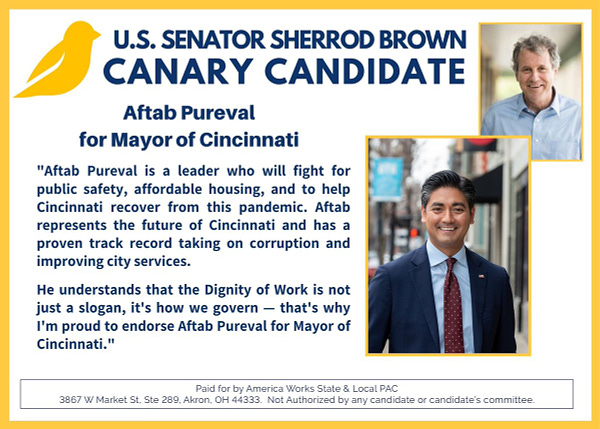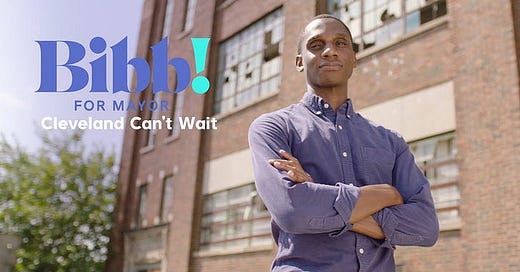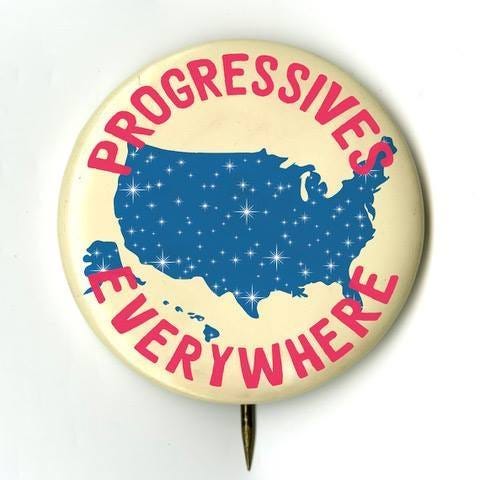Welcome to the big Sunday edition of Progressives Everywhere!
I’ve got some exciting news for you today: Progressives Everywhere just launched our municipal elections fund, which allows supporters to donate to a list of dedicated, viable progressive candidates in city and county races across the country.
Today’s newsletter will look at our initial list of candidates, which will grow over the next few weeks, and the political dynamics of their races. Social progress and economic justice tends to spread outward from cities and counties into statewide standards and national legislation, so electing good progressives in these elections is absolutely paramount.
As for the big national headlines, Tuesday’s premium newsletter will be packed with stories about the titanic clash over the newly scheduled infrastructure vote; the coming aftermath to a hard dose of reality just delivered to Kyrsten Sinema; and all kinds of machinations in states where health care, abortion rights, voting rights, and other essential liberties are in flux. And by the end of the week, I’ll have some big new details about our upcoming podcast launch!
On Thursday, New York City Mayor Bill de Blasio signed the nation’s first-ever bill of rights for delivery workers, guaranteeing a minimum wage and baseline working conditions for a segment of workers that have for years braved treacherous routes and routine exploitation with zero protection.
The new law was a hard-fought political victory for the workers, advocates, and labor organizers, who waged a relentless campaign to elect likeminded city council members and convince others to back the legislation. And yet, it was a bittersweet week for progressive community activists in New York, as two more people died at Rikers Island, the Dickensian slum prison complex where people are often held for years before even facing trial.
At least a dozen prisoners have died amid the squalid conditions this year, many of them by suicide. The epidemic and the increasingly horrid conditions at Rikers has triggered a new call by lawmakers to close the carceral cluster right away instead of in 2027, when it is currently scheduled to be shuttered. de Blasio, who hasn’t visited Rikers in four years, finally agreed to visit next week, but he has little sway over what happens next; that responsibility will fall to Eric Adams, the presumptive new mayor, a former cop who says he supports closing the facility over time but is also in favor of tactics like stop and frisk in a city that saw some of the biggest Black Lives Matter protests in the city last year.
Complicating matters is the fact that Adams’ victory in a strange and volatile Democratic primary in June means that there is little leverage to extract more concrete promises on Rikers or changes to his policing platform. Instead, the presumptive mayor in this overwhelmingly Democratic city has been lunching with Republicans, raising money in the Hamptons, and vacationing in Monaco.
The gulf in political ideology between the more progressive incoming City Council and Adams’ frequently conservative leanings mean that the next four years are likely to be volatile, packed with battles over housing, policing, labor conditions, and other key issues that govern the everyday lives of eight million people.
Fortunately, in many other major cities and municipalities across the country, instead of being fait accompli, the upcoming November elections are still very much up in the air. Many feature real progressive candidates promising systemic change, and in a fair number of cases, those candidates are positioned as viable options. Some are even frontrunners.
With so much of the media focused on our interminably gridlocked and nakedly corrupt federal government, these elections risk going under the radar. At the same time, the lack of national attention means that smart investments from small donors can still make a significant difference just over a month out.
Here is our first list of candidates and elections, with insight into some of the most intense and high-stakes races. You can donate to one, some, or all of the candidates below:
Ohio
Cleveland
Justin Bibb and council candidates: After nearly two decades of rule by outgoing mayor Frank Jackson, this slumping city is in need of fresh blood and a new direction. Bibb is a 34-year-old progressive who offers both and in fact has already injected a fair amount of excitement into a city political process generally run by a creaky old machine.
He won a surprise victory in the jungle primary earlier this month, so he’ll go up against the current City Council President Kevin Kelley, a more moderate and establishment Democrat.
Bibb today earned the endorsement of the city’s biggest paper, the Cleveland Plain Dealer. He’s running with a slate of mostly young progressive city council candidates who would help him enact a transformative agenda. We’re supporting Richard Starr, Rebecca Maurer, and Mario Snowden in our initial list, though Starr is not on ActBlue (you can donate to him here).
Cincinnati
Aftab Pureval and council candidates: This is another generational battle, which is going to be a running theme in these endorsements. At 39, Pureval, the current Hamilton County Clerk of Courts, is less than half as old as his opponent, the 81-year-old city council member David Mann. Both are Democrats, but Mann has been propped up in this race by business and Republican groups, who only make up about 25% of the city.


The first debate between Aftab and Mann was a fiery affair that included some personal shots (mostly from Mann) and exposed a stark difference in their positions on policing and criminal justice. Mann has the backing of the cops union, while Pureval wants to focus on sending out civilian mental health first responders during certain emergencies.
All nine seats on the Cincinnati city council are elected at-large, with the top nine vote recipients earning spots around the table. There are a number of good progressive council candidates on a list that includes more than two dozen names, and in our first round, we’re backing Cam Hardy, Brian Garry, and Jaime Castle.
Florida
St. Petersburg
Richie Floyd: The 30-year-old teacher and democratic socialist became a galvanizing figure this summer when he earned over 50% of the primary vote and out-raised his opponent by a significant margin. Recent polling has it as a much tighter race between Floyd and his far less progressive opponent, who was on the city council from 2005 to 2013.
Floyd would fight for housing, environmental, and economic justice on the city council after helping organize and pass medical marijuana and minimum wage increases via ballot initiatives.
Miami
Quinn Smith: Incumbent City Commissioner Joe Carollo is about as Trumpy as it gets for a lawmaker in a Democratic city. He is swimming in real estate developer money, outspoken against even the most mild police reform, gets into frequent fights with other public officials, and was the subject of a recall effort that flopped on legal grounds during the height of the pandemic.
Quinn Smith, an attorney who was recruited by Run for Something, doesn’t have the same political connections or powerful donors, but he’s been steeped in the community and isn’t interested in endless public feuds.
Georgia
Atlanta
Felicia Moore: After appearing on Joe Biden’s shortlist of vice presidential contenders last year, mayor Keisha Lance Bottoms shocked the political world when she announced that she would not run for re-election this past May. The decision opened a wider lane for former Mayor Kasim Reed, who is attempting to win back the office despite an ongoing federal investigation into alleged campaign finance violations.
The investigation isn’t an anomaly, as Reed’s previous administration was beset with corruption.

Moore currently serves as the Atlanta City Council President and is the only candidate with the public profile and experience to defeat Reed, who retains some popularity despite his many scandals and fear-mongering about crime. Moore and Reed are neck-and-neck in recent polling.
North Carolina
Wake County
Damon Chetson: As Carolina Forward founder Blair Reeves put it to me in an interview last week, North Carolina and Georgia sit on two sides of a knife’s edge; each state has a growing and diversifying urban base that is increasing the Democratic Party’s vote share, but while Georgia went blue in statewide elections in 2020, North Carolina fell just shy of flipping last year.
Still, the tide is turning in local elections throughout North Carolina, where more progressive candidates have been making waves and winning power. Due to the census delay, many of the state’s municipalities pushed back their elections until 2021, making the DA race in Wake County perhaps the most consequential and heavily watched contest on the ballot this coming November.
Damon Chetson is promising a new direction in the county of more than one million residents, including no longer pursuing the death penalty or low-level marijuana charges in a state where weed has not been legalized.
New York
Buffalo
India Walton: No other mayoral race this year can compete with the level of drama, endemic corruption, and downright symbolism in this upstate slugfest. India Walton, a nurse, longtime community activist, and democratic socialist, shocked the state’s political establishment when her determined grassroots campaign knocked off four-term incumbent Byron Brown in the Democratic primary.

Brown decided to run a write-in campaign powered by real estate lobbyists and conservative donors, and for a time, he even had a spot on the ballot thanks to an audaciously corrupt decision by a judge with all kinds of financial ties to Brown’s administration. Two subsequent rulings knocked him off the ballot, but given his name recognition and support from several allies on the city council, he could well win anyway.
That Buffalo-bred Gov. Kathy Hochul refused to endorse Walton, the official Democratic candidate, doesn’t help much either, even if it’s another sign that Hochul is as much of a machine conservative as her disgraced predecessor, former Gov. Andrew Cuomo. On the other hand, Public Advocate Jumaane Williams, who nearly upset Hochul in the 2018 race for lieutenant governor and is considered a potential challenger for governor next year, has been all-in on Walton’s candidacy from the start. They were both supported by the Working Families Party.
Walton would be the first socialist mayor of a city of Buffalo’s size since the tail end of the sewer socialist era in Milwaukee all the ways back in the 1960s. She has prioritized helping the poor and working people in a city that has become increasingly gentrified and expensive over Brown’s tenure, which saw the parallel rise of a fancy downtown district and income inequality.
Washington
Seattle
Nikkita Oliver: The race for the one open at-large seat on the city council truly epitomizes the political environment in a city torn between tech money and left-wing pushback.
Nikkita Oliver, a lawyer and community activist, ran for mayor in 2017 and rode a populist-progressive grassroots movement to a surprisingly strong third place finish, just missing the final runoff. Sara Nelson is a wealthy brewery owner with a longer political history but much more moderate, pro-business policy platform.
Oliver has the backing of a 100,000-member county labor union council and has focused their campaign on equity, opportunity, affordable housing, and criminal justice reform. Nelson is against raising taxes on the rich or extending tenant protections in a city where housing prices continue to skyrocket and homelessness is a top political and civic concern.
Seattle caps the amount of money that candidates can raise, but Oliver is accepting pledges to donate if that cap is raised at some point during the campaign, as is likely to happen.
Wait, Before You Leave!
Progressives Everywhere has raised over $6.2 million dollars raised for progressive Democratic candidates and causes. Isn’t that cool?
But raising money doesn’t pay the bills — I don’t get a dime of it. And because the only way progressives will be able to rescue this country is by creating their own sustainable media ecosystem, I need your help.
I’m offering very low-cost premium subscriptions that offer you a lot of goodies and will help me hire another writer/researcher to make this newsletter even better. If you become a member of Progressives Everywhere, you’ll get:
Premium member-only emails featuring analysis, insight, and local & national news coverage you won’t read elsewhere.
Exclusive reporting and interviews
Coverage of voting rights, healthcare, labor rights, and progressive activism.
Early access to every new episode of the upcoming Progressives Everywhere podcast
You can also make a one-time donation to Progressives Everywhere’s GoFundMe campaign — doing so will earn you a shout-out in an upcoming edition of the big newsletter!





